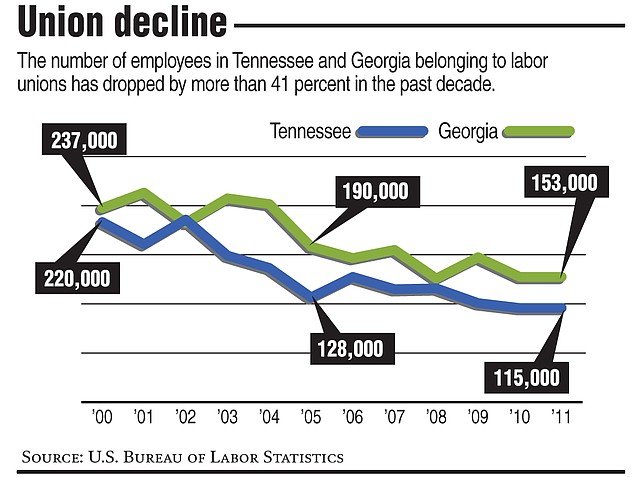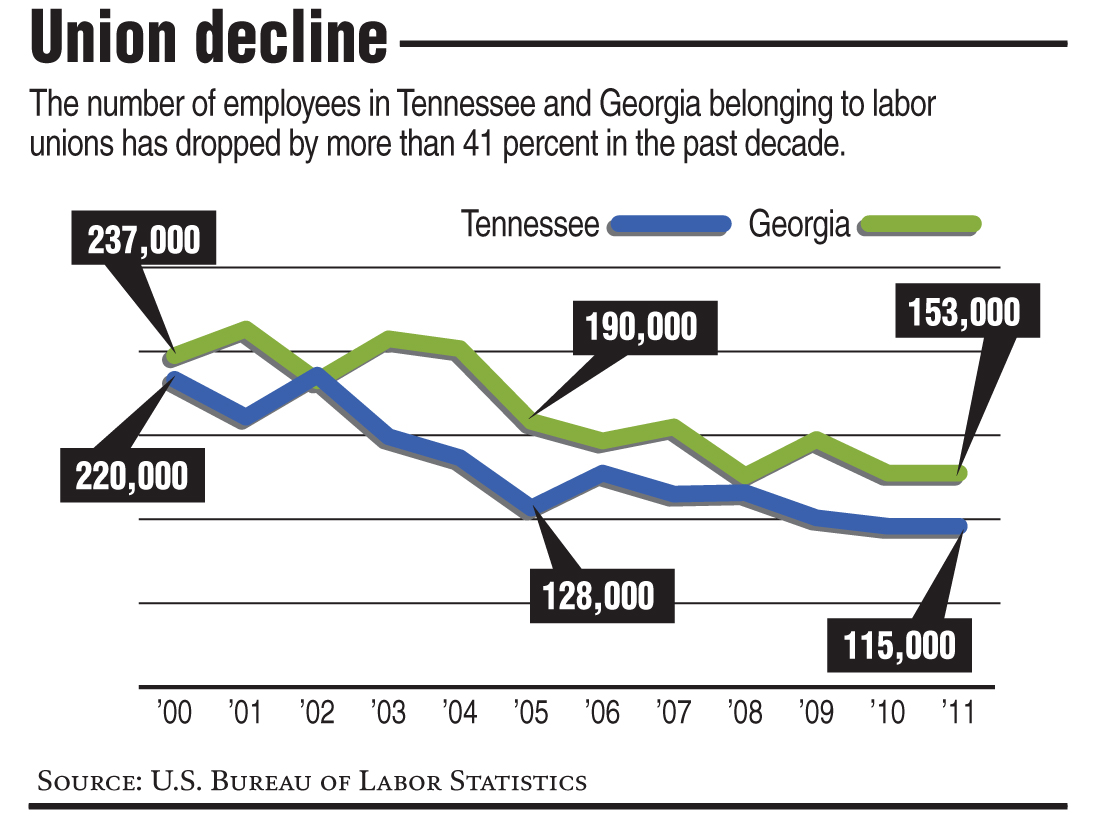United Auto Workers eyes Nissan in Mississippi
Friday, January 1, 1904
CANTON PLANT TIMELINE• November 2000 - Nissan announces plan to build $930 million manufacturing plant in Canton, Miss.• April 2001 - Construction starts• February 2002 - First Mississippi residents report to work as production technicians. Before production starts, Nissan announces it will add 1 million square feet to produce Altima in 2004.• May 2003 - Plant opens• September 2012 - The factory, which employs about 4,350 workers, makes Altima, Titan, Armada and NV passenger and utility vans. This fall, production of Frontier, Xterra and Sentra will begin.Source: NissanLEAST UNIONIZED STATESThe states with the lowest percent of wage and salary workers who are members of a union are all in the South. Nationwide, 11.8 percent of all American workers belonged to a union in 2011.1. South Carolina, 3.4 percent2. Georgia, 3.9 percent3. Arkansas, 4.2 percent4. Louisiana, 4.5 percent5. Tennessee, 4.6 percent5. Virginia, 4.6 percentSource: U.S. Bureau of Labor Statistics
When Nissan announced in 2000 that Canton, Miss., was the site of its second U.S. assembly plant, company chief Carlos Ghosn was pictured in a newspaper amid a throng of happy people.
"A sense of family was the message conveyed at the time," said Joe Atkins, who teaches journalism at the University of Mississippi. Now, "a lot of workers don't feel like family. At best, its third cousin, twice removed."
Today, while workers mark the Labor Day holiday, Canton is ground zero in the United Auto Workers' latest effort to organize a Southern automotive assembly plant.
Chattanooga's Volkswagen factory, or the Mercedes-Benz plant in Vance, Ala., had been considered by many as potential UAW targets.
Earlier this summer, the UAW turned to the Canton plant, where more than 70 percent of the workers are black and the union seeks to recall the civil rights movement in the organizing effort.
Still, Mike Randle, editor of Southern Business & Development magazine, said the UAW faces an uphill battle.
"These plants are not going to go union. There's no real benefit they're bringing to the table." he said. "[The UAW] is going to try. That's what they do."
Two previous efforts to organize workers at Nissan's Smyrna, Tenn., plant have failed, the last in 2001.
But Nissan employee Wayne Walker, a 38-year-old production technician at the Canton plant, said a lot of workers are "really interested" in the UAW effort.
"It's very important," he said, adding that union representation will give the workforce a voice on issues such as benefits, safety and fairness.
Gary Casteel, regional director of the UAW, could not be reached for comment. But he told Reuters in July that worker rights is the civil rights battle of the 21st century.
"The civil rights experience was fought on that very ground," he said about Mississippi.
Ghosn, the Japanese automaker's chief executive, told Reuters that the company has developed a smooth manufacturing process that relies on direct communication with workers, and UAW involvement would hinder that connection.
Atkins, who has written extensively on labor issues, said the UAW believes the Canton workforce, which numbers 4,350, will be more open to union membership because of social factors such as the civil rights legacy.
The auto assembly jobs are some of the best in the entire state with workers often earning in the range of $23 per hour, he said. But some workers with whom he has talked question whether they have a voice, Atkins said.
The UAW's success may depend on how much grassroots work it does, he said. Union organizers have tried to become involved in community panels and even tap into the religious fabric, Atkins said.
"They've invested a lot of effort in it," he said. "They've been here a number of years and built network connections with a variety of organizations."
Atkins said no election date has been set.
If the UAW wins, he said, other auto plants in the region will be on its radar.
UAW IN CHATTANOOGA
This spring in Chattanooga, the UAW ramped up early organizing efforts as union materials were passed out to workers to gauge their interest.
"They will make the decision," Jonathan Browning, Volkswagen Group of America's chief executive, said this summer in Chattanooga. "We hope it will be well informed."
A VW employee who didn't want to be identified said he didn't think the effort had enough interest at the time. But the worker said in an email that he was sorry to see a lot of overtime work go away with the hiring of more employees at the plant.
The changes, which have helped lead to the hiring of about 800 more workers at the Chattanooga plant and a three-team daily production schedule, were designed to give a more steady workload to its employees, according to the German carmaker.
Also potentially weighing into the UAW's decision regarding VW was a statement by a powerful union chief in Germany. Bernd Osterloh, who represents labor on the VW supervisory board, said late last year that while he was keen to see labor representation at the Chattanooga plant, he would not actively promote UAW efforts to broaden membership there.
The Chattanooga factory is VW's only one of more than 60 worldwide that doesn't have some organized labor representation, according to VW. At this point, wage rates are also lower for most production workers at the VW facility in Chattanooga than what comparable employees are paid at Volkswagen's unionized plants in Germany or even the Nissan factory the UAW is trying to organize in Mississippi.
Southern comfort
The share of workers who belong to unions is lowest in the South where unions historically have not had as much influence or support. Right-to-work laws in most southern states also don't require an individual to belong to a union or pay union dues even when a majority of the workers at a company vote to unionize.
With only 4.6 percent of all workers belonging to unions in Tennessee, the Volunteer State ranks fifth-lowest in union representation among the 50 states, behind only South Carolina, Georgia, Arkansas and Louisiana.
Gary Moore, a state representative from Joelton, Tenn., who serves as Tennessee president for the AFL-CIO, hopes that union membership has bottomed out in the state after declining by more than 40 percent in the past decade.
"There is certainly a potential for growth in the UAW here with the GM plant expansion in Spring Hill and obviously the Volkswagen plant is a good potential for union representation," he said. "There are always opportunities to organize, although that is done by the local unions."
Moore said unions give workers a voice where they work and help ensure adequate wages and benefits.
According to the Bureau of Labor Statistics, full-time workers represented by unions during 2011 earned a median weekly salary of $938, or 29 percent more than the median pay of $729 a week for non-union workers.
But Randle said he doesn't see the UAW with as much clout as in the past.
"They were a lot stronger 10 years ago," he said.
"Change for the South"
Walker, who has worked at the Canton plant since 2003, said interested workers are meeting at the UAW hall and reading literature while trying to fend off what he called intimidation from the company.
"If we're successful here, it will send a message," he said. "It will mean a change for the South."
Atkins said there's a lot at stake in the outcome in Canton.
"If it happens in Mississippi, it will be such a big story," he said. "It will get a lot of people thinking."
Business Editor Dave Flessner contributed to this report.

